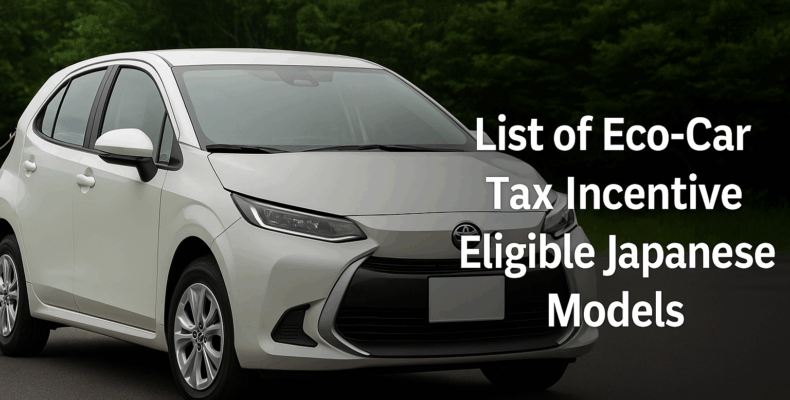Understanding Japan’s Eco-Car Incentive Program and the Best Vehicles to Export
Japan has long supported environmentally friendly vehicles through a national eco-car tax incentive program that rewards low-emission, fuel-efficient vehicles. These vehicles not only benefit local Japanese drivers but also present great export opportunities thanks to their cleaner engines, better fuel economy, and higher resale value.
In this article, we’ll outline how Japan’s eco-car tax system works and list popular Japanese models that are eligible — making them ideal for international buyers, dealers, and fleet operators.
1. What Is Japan’s Eco-Car Tax Incentive Program?
The Japanese government offers tax reductions and exemptions for vehicles that meet specific environmental standards, including:
-
Low CO₂ emissions
-
High fuel efficiency
-
Compliance with emission control standards (e.g., 2005, 2010 levels)
Incentives include:
-
Reduced or waived vehicle acquisition tax
-
Discounted vehicle weight tax
-
Lower annual road tax in some prefectures
These incentives apply to new vehicles, but they also help increase the future resale value of used cars that qualified.
2. Why This Matters for Export Buyers
Cars that once qualified for Japan’s eco-car program tend to:
-
Be better maintained by first owners
-
Offer higher fuel efficiency
-
Retain better emission system performance
-
Qualify for lower import duties or registration taxes in some countries
For overseas buyers, this means long-term cost savings and higher demand.
3. Popular Japanese Eco-Car Models That Qualified
Here’s a list of well-known Japanese models that have historically been eligible for eco-car incentives:
Toyota
-
Toyota Prius (All generations)
-
Toyota Aqua (Yaris Hybrid)
-
Toyota Corolla Hybrid
-
Toyota Sienta Hybrid
-
Toyota RAV4 Hybrid
-
Toyota bZ4X (EV)
Honda
-
Honda Fit Hybrid
-
Honda Insight
-
Honda Freed Hybrid
-
Honda Accord Hybrid
-
Honda e (EV)
Nissan
-
Nissan Note e-POWER
-
Nissan Leaf (EV)
-
Nissan Serena e-POWER
Mazda
-
Mazda2 Hybrid
-
Mazda CX-30 (Mild Hybrid)
-
Mazda MX-30 EV
Subaru
-
Subaru XV Hybrid
-
Subaru Forester e-BOXER Hybrid
These models are all fuel-efficient and low-emission, making them great candidates for eco-conscious markets and resale in regions with strict emission laws.
4. Export Tips for Eco-Car Buyers
-
Check emission standards required in your country (Euro 4, 5, 6, etc.)
-
Confirm battery condition for hybrid or EV models
-
Ask exporters for fuel economy and tax history reports
-
Consider models with verified low mileage and full service records
Most trusted exporters will provide full documentation and condition reports upon request.
5. Trusted Exporters of Japanese Eco-Friendly Used Vehicles
If you’re seeking eco-car incentive-qualified vehicles, choose exporters who understand both the technology and the paperwork:
-
EVERY Co., Ltd. – Focused on quality Japanese exports
-
SBT Co. Ltd.
-
Be Forward
-
Qualitex Trading
-
Autorec Enterprise Ltd.
These exporters are experienced in shipping hybrids, EVs, and low-emission vehicles with care and compliance.
Learn more:
Top Recommended Japanese Used Car Export Companies for International Customers
Final Thoughts: Eco Incentives That Keep Giving
Japanese eco-car tax incentives not only promote cleaner driving inside Japan — they also add value to used cars on the global market. Whether you’re an importer, dealer, or eco-conscious buyer, choosing a vehicle that once qualified for these incentives is a smart, sustainable move.
Looking for your next low-emission car? Start with the models that Japan trusted first.
